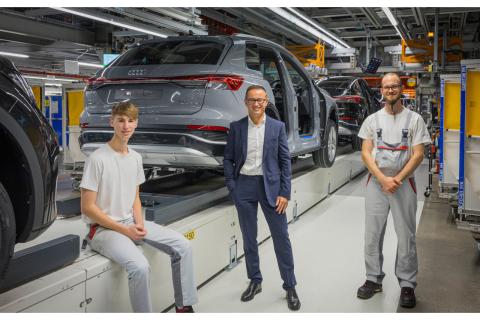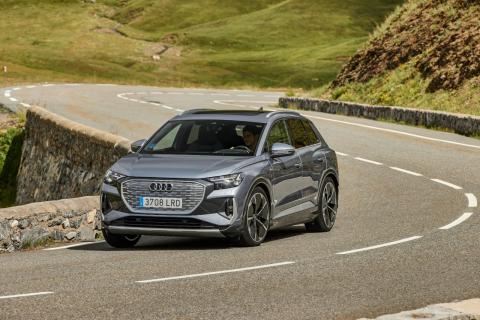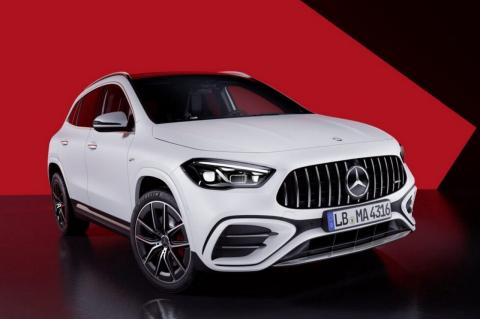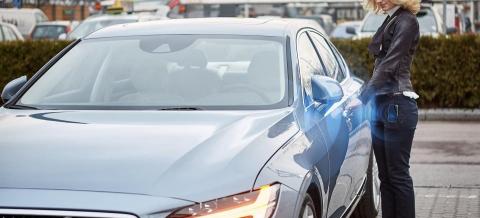Soneira is, along with Xavier Ros, one of the few Spaniards who has come this far at Audi and reports directly to the CEO of Audi AG
Fermin Soneira. This name may not sound familiar to you, but Fermín Soneira (Gijón, 1972) is one of the so-called Spaniards in the automotive world who has come the furthest.
Soneira grew up in the warmth of his father’s garage, where he discovered his love for cars and engines. She began studying Industrial Engineering in Oviedo and finished it in Osnabrück (Germany), from where she entered Audi AG directly in the Chassis Development department.
From there he went to Seat, where he was at the Technical Center for 12 years, to return in 2014 to the mark with the four rings. He took over as Vice President of Product Marketing in 2016 and since August 2020 has been responsible for the Product Line Electric Vehicles at Audi AG.
AUTO BILD took advantage of its time in Madrid, where it stopped to collect an award, to talk about cars, but especially electric cars.
How do you see the state of electrification in Spain? What brakes do you see?
There are several, but the fundamental one is that of infrastructure, which is what speeds up change or slows it down. And here we are a little late. It is true that a lot is being done and I think there are going to be many changes in the next two years.
Then we also need to be able to supply all the cars that are demanded of us; demand is high and right now we have supply problems.
Do you think that on a global level and then also specifically in Spain, people on the street associate Audi with an electric brand or that it is already on the way to being fully electrified?
Yes, not only do I believe it, but we have the data. And our evolution as a brand is clearly a positioning of a sustainable electric brand, of the future, in transformation. And the truth is that the response we are getting from the market, from customers, is very, very good.
But I’m not talking about customers, but about perception in general. How do you manage to convince the new generations that Audi has a product that is much better than that of Tesla or Chinese electric brands, which do not have the backpack of being a traditional combustion brand?
The backpack is a drawback and an advantage, because the backpack is not made of stones. There is experience and brand and a commercial network that is in contact with the client. It is true that new competitors have emerged, Chinese brands that are doing very well and are arriving very quickly. The landscape is changing.
It is good that there is competition, it makes you improve what we have to be very clear about where we are going and how we want to position ourselves as a brand. And neither go crazy because others do different things.
And there I think that we are right, we are reaching customers. The new generations have other demands, it is true, but Audi is still a premium brand with good design. And the data shows that we are not losing young customers nor are we falling behind as a brand, but rather that we are clearly betting on the new faster mobility.
And how do you explain to someone that on the one hand there is a firm commitment to electromobility and at the same time Audi enters Formula 1 and, like Porsche, is now also committed to e-fuels? Isn’t that a contradiction? How is this combined?
I think it is explained if you take into account that Formula 1 is going to transform from 2026 and has a clear objective of carbon neutrality in 2030, by the way, much earlier than the sector in general, in 2030.
Formula 1 aims to be carbon neutral, which in the end is the ultimate goal, if we talk about sustainability. If, in addition, we take into account that Formula 1 within the entire world of competition is clearly the spearhead, what has the highest priority, what has the most impact, I think it is the perfect time to enter. Makes sense.
Synthetic fuels are going to have their market niche also in traditional cars. On a personal note, I love Audi in Formula 1, because I really like competition and, furthermore, I think it’s very worthwhile that we’re committed to developing our own technology. We are not going to sponsor just one team, but we are going to develop our own.
I don’t doubt it. As a fan, the truth is, I am very happy. But, of course, it shocks me coming as Audi came from Formula E…
The question is logical because more people ask it. I think we have to explain it well. In the end, it’s not just about mobility. That is to say, neither does anyone say that everything else cannot exist and that it does not make sense, that only security makes sense. Audi would not participate in Formula 1 if it did not have a goal of being carbon neutral.
Because then we cannot say that we are going to the community for that and then play in the competition with other rules. But that is the objective: the f1 cars are going to be more electrified, they are not going to be 100% electric, but they are going to be more electrified than today. Well, just as we participated in the Dakar last year, this year with an electrified car. They are steps on the right path.
How would you try to convince an old-school person who has been living with an internal combustion engine all his life to go electrification?
I’m from the old school or was from the old school where my father had a garage and I grew up smelling of gasoline. I love engines. It was the reason I got into the car, because I loved those machines and how they worked. And I still like them, but I have been very clear for a few years now that the future is electric or it won’t be.
And because, in addition, I have a lot of fun doing it for three reasons and that’s where I go to the answer that I would try to do it. First, give the old school a chance to drive electric, and I know there are a lot of clichés. The electric vehicle is more fun than driving a combustion car, because in the end what we most notice when driving is the longitudinal acceleration.
If you have had the opportunity to try an Audi e-tron GT, you know that it is impressive, very fun, that is, the cliché that an electric car is not fun to drive falls away. The second thing is that if we put into the total cost of the car and the daily expense and the cost of maintenance, it turns out that it is cheaper; It depends on the country, the aid and so on, but in general, let’s say at least it’s the same.
The third thing is that when you drive an electric car you realize how things change when the infrastructure appears. I have been driving electric cars in Germany for three or four years. I always comment that at the beginning the first few months were stressful, I had to plan my route very well, I didn’t know very well if the charger would work or not, it was stressful. That changed in two years.
In addition, I almost always charge at work, at home and almost never on the road; only when I go on a very long trip, which is a couple of times a year. There are rational factors that can be put on a little board, but you overcome them when you drive and, in fact, whoever buys and drives an electric doesn’t back down. He stays with the electric.
Of course. But there is also another factor that is right now: the economic one. And for starters, an electric is between 20% and 30% more expensive than an equivalent internal combustion model…
As much as 30%, no; 20%. It depends on the VAT model, but it is true. Of course it is a brake, and the situation in general is very difficult and there is a lot of news that the world seems to have gone a little crazy. You have to look a little longer in the long term. These things will also pass, hopefully.
But there are more things. One that is inevitable: I am convinced that climate change is a reality. And if we don’t stop it, it’s going to be an economic drama just the same. And we all have a responsibility. If you have to give up something to solve such a big problem, maybe you have to do it. But it is that, in addition, it is not necessary to give up the products.
That is why the industry has put the batteries. We have become very competitive with the electric car and the people who drive it enjoy it a lot. The price is a barrier. Maybe a solution sometimes is to go to a lower segment. I’m sure you’re right, that a Golf from 15 years ago has nothing to do with a Golf from now.
An Audi Q4 e-tron has the same interior space as a Q7. People who drive an electric car who have the opportunity, do not back down. And in Spain we are going to see how the infrastructure develops, and surely we will sit down in three years and see how the numbers are. And you will see that things have changed quite quickly for the better.
Do you think there will be enough minerals by then to power all the batteries?
Yes, yes there will be. First, because our forecast is long-term. We secure the supply chain. He thinks that the VW group is going to invest in five or six battery plants in Europe. The most recent that has been communicated, you already know, is that of Sagunto, in Spain.
We do not set up a battery factory without knowing if we have minerals or if there is no guaranteed capacity. But, in addition to that, I think there will be a technological development as well. I always say that many years ago it was said that oil disappeared and deposits continue to be found. It will end one day. But the human being is capable of developing many new technologies.
It is sometimes even heard of obtaining rare battery materials from meteorites. We will find solutions to the problem.















